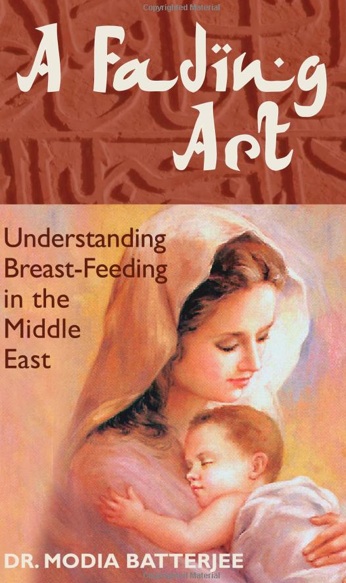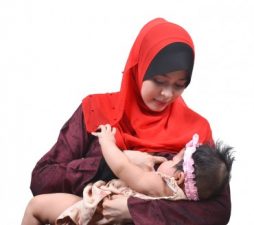Even if you didn’t give birth to the baby, you can still feed it to make it “yours” in Muslim communities. Here’s how.
Under Islamic Sharia’a law, western adoption practices are frowned upon. When children are abandoned by their birth parents, they may become foster children of other families, but they are not allowed to take on their foster parents’ last name, or to have any rights of a mahram (an unmarriageable kin with whom sexual intercourse is considered incestuous). Only one thing has the power to overcome these restrictions: Breastfeeding.
In countries such as Saudi Arabia, where Islamic law is the rule, breastfeeding an infant or child under the age of two years gives the adopted child the rights of birth making them a mahram.
The Holy Quran clearly states, “Let another woman suckle (the child) on the (mother’s) behalf” (65:6), “Forbidden to you are…your mothers that have suckled you and your foster-sisters” (23:4), and the Hadith by Aisha (blessing of Allah upon her) says, “Breastfeeding denies what is denied by birth.”
These statements support the notion that other than the birth mother, any lactating woman can be the milk-mother of a child and give that child the same birthrights as her own. It is agreed upon by Islamic scholars that in order for her to accomplish this she must feed an infant three to five satisfying feeds.
A satisfying feed is approximated at around 50 ml of expressed breast milk; as soon as she has completed these three to five feeds, she is considered a milk-mother by Sharia’a law and has rights to the child that are identical to those of any birth mother. Having a milk-mother means the child will be a child to her husband, a sibling to her children, and a relative to all extended family members.
 Contrary to what many people think, any woman can breastfeed, whether she has recently delivered a baby or not. It is biologically possible for a woman to lactate or relactate, regardless of her childbearing status. I have experienced this possibility in my breastfeeding resource center in Jeddah Saudi Arabia, where I live, while working with several adoptive mothers.
Contrary to what many people think, any woman can breastfeed, whether she has recently delivered a baby or not. It is biologically possible for a woman to lactate or relactate, regardless of her childbearing status. I have experienced this possibility in my breastfeeding resource center in Jeddah Saudi Arabia, where I live, while working with several adoptive mothers.
My clients are women who had been married for many years and had difficulty conceiving a child. Under my supervision the mothers adopted and breastfed infants around the age of four months old with 250 ml of expressed breast milk.
Lactation and milk expression took approximately two weeks. To encourage lactation, the mothers began by orally taking 60 mg of Domperidone a day and several cups of brewed Fenugreek while pumping and stimulating their breasts every two hours.
During the first week, small beads of milk could be seen coming out of the nipple; by the end of two weeks, the mothers were able to express 250 ml of breast milk, fulfilling the need for the five feeds to make the children their own.
In some instances, as soon as the child was fed the full 250 ml, the mother ceased the medication and stopped pumping as the milk diminished naturally. In other instances the mothers continued to pump and feed the babies the milk that was expressed.
Adoptive breastfeeding is a beautiful option for couples in the Middle East who want to adopt a child and give him or her full family rights, and for a child who needs loving parents. Adoptive breastfeeding is a tool that can be used to improve lives. It forces the biological relationship to be primary to rearing an adopted infant. Through breastfeeding, nature has given women a means to give life, improve circumstances, and correct social problems.
More resources on breastfeeding in Islam:
Muslims who breastfeed save the planet
This guest post is by Dr Modi Batterjee from the Al Bidayah Breastfeeding Resource and Women’s Awareness Center in Jeddah, Saudi Arabia. She’s written a wonderful book on breastfeeding, A Fading Art.




I love this post! I run a breastfeeding support group and host a website called Breastfeeders in Australia. I have been looking for a guest blog to write about breastfeeding in Islam. I feel your values promote and value breastfeeding much more than Western culture, and in my niche, it’s something women love to learn about. Modia, if this is of interest to you, or anyone else, please contact me at [email protected]
Hi would like to say big thank to UK Susan baby home i recently adopted a child from them and it all went through well and will also advice anyone who need baby to adopt to contact them email:[email protected] please do this and save a life.
my niece just got a baby girl , born 8 days ago. She was breasrfed by her biological mother for the first 4 days and handed over to my niece who adopted her.
Question ; Is there any side effect to the meds?
What are the advices you could give her about breastfeeding,? she is a very dedicated adoptive mother and like to do things by the book.
My husband has an illegitimate daughter who is now 3 years old. Her mother is now unable to look after her and we would like for her to live with us but are unsure how to proceed with regards to Islam (the Western courts have agreed that we will have legal custody for her).
We have older children and want her to have the same last name, etc so that she doesnt feel different and so that her illegitimacy wont be a burden for her as she grows.
If I lactate and then express the 250ml and she drinks it out of a cup or bottle (she still uses one at bedtime) will she be Islamically ”adopted”?
If she’s your husbands daughter and you are sure of it, and he claims her, then how come she wouldn’t be regarded as a sibling among her other siblings? However, I don’t know everything about the kinship of an illegitimate child, so its best if you ask a qualified scholar or mufti. You can ask on islamqa.com/en. Also, the breastfeeding kinship wouldn’t work on her now, because she has to be below two years old. That I’m pretty sure about.
I followed a similar plan and was able to successfully feed my adopted son. I was blessed to be able to start when he was only 2 days old. I worked closely with an experience lactation consultant. Although my milk supply was not the full amount he needed I was able to use supplement bags so that it would not wean him off the breast milk. With this method I nursed with supplements until he was 2 months. (2 months switched to bottle and nursing for comfort and any breast milk he could get. ) I had gotten up to producing 2oz in 15 minutes of pumping.
This should be researched further. I too thought of this after not being able to conceive. I have been able to breastfeed successfully a child (who was not my own). Later, I found that the milk that was expressed must be the milk of the husband, i.e. through his having gotten the woman pregnant. If the milk is not from the husband, it is not considered breastfeeding according to the Shariah. This is what helps in making the child halal to be around the husband and his other children.
I don’t think this is correct. Babies can become “milk siblings” or “milk relations” merely by feeding from a wet nurse (who was not impregnated by the same sperm), therefore it makes sense that an adopted mum can establish the same relationship.
Hi Ladies, from my experience most women were not able to feed directly. The main reason is that by the time the process of the adoption takes place the baby is already over 3 months old and it is quiet difficult to shift a baby from bottle to breast at that age. There are so many changes going on for the baby most mothers prefer to do what is less stressful at that time. The amount of milk required at 50ml is an approximation determined by Islamic scholars to give mothers a guide to follow. The Hadith was vague so I agree that it is closer to being symbolic and not a solid rule.
My sister adopted a little boy from morocco, she also used medication and a lactating tea to breast feed him. But to be one the safe side she had me also breastfeed him. When she brought him home he was three month old, my son was two weeks old, He breast feed from me 5 full feeding, where he feed until he was full and was burped. The doctor was amazed that a 3 month old who was never breast feed latched onto a breast. It was difficult at first, but what we found worked was if we dripped some milk into his mouth first, or drip some on my nipple.
It seems to be symbolic mostly
noreen, 50cc is less than 2oz. That’s not a large feed at all. Babies should get at least an ounce per feed by one week of age, and it only increases from there.
I was wondering the same question as Hannah. I also feel that 50ml is quite a bit of breast milk for one feed. Where did that number come from?
Hi Dr. Batterjee,
Thank you for sharing your experiences with adoptive mothers, and pointing out that women do have the option. Has any woman you worked with gone on to breastfeed directly, or only via pumping/bottle?
-Hannah
dr batterjee
i,m taking domperidone 10 mg 3 tablets 4 times.only milk drops coming.i,m not pumping is it correct dose or it should be 6 tablets/dose.u mentioned 60mg/day or dose please help me thx my baby is five mnths old now is there any centre in abudhabi..that can help
Farida, sorry I didn’t get back to you earlier. If you want to improve your milk supply while using domperidone (60 mg/day) you must be breastfeeding or pumping as well to physically stimulate the breast. I highly recommend stimulation first before using medications as your body already has the hormones it needs after delivery. Then if you need extra help you can take a natural aid such as fenugreek. Leave the medication for a very last resort. Pumping and direct breastfeeding together can easily increase your supply without the meds.